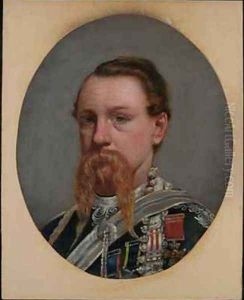Capt. I.A. Goldingham Paintings
Captain I.A. Goldingham was a figure of the British colonial era, whose contributions spanned beyond military service to include significant work in art and science, particularly in the fields of astronomy and cartography. Born in 1793, Goldingham's life was intricately woven into the fabric of the British Empire's expansionist policies and its scientific pursuits during the 19th century.
Goldingham is perhaps best remembered for his role as an officer in the British Army, but his legacy extends into his work in India, where he was stationed for a considerable part of his career. It was in India that Goldingham's interests in the sciences flourished, influenced by the rich cultural and historical tapestry of the subcontinent. He was particularly drawn to astronomical observations, contributing to the establishment of observatories and the advancement of astronomical science in India. His work in this area helped lay the foundations for future scientific endeavors in the region.
In addition to his astronomical pursuits, Goldingham also made significant contributions to cartography and geographical exploration. His detailed maps and charts were crucial for the British military and helped in the administrative consolidation of British territories in India. These contributions were not only valuable for their immediate practical use but also for their role in advancing geographical and cartographic knowledge during the period.
Despite his diverse interests and contributions, Captain I.A. Goldingham remains a relatively obscure figure in the broader narrative of British colonial history. His life and work reflect the complexities of this era, characterized by the interplay between military conquest, scientific exploration, and cultural exchange. Goldingham's legacy, encapsulated in his contributions to astronomy, cartography, and military service, offers a unique perspective on the multifaceted roles played by military officers in the British Empire. He passed away in 1861, leaving behind a body of work that continues to be of interest to historians and scientists alike.
